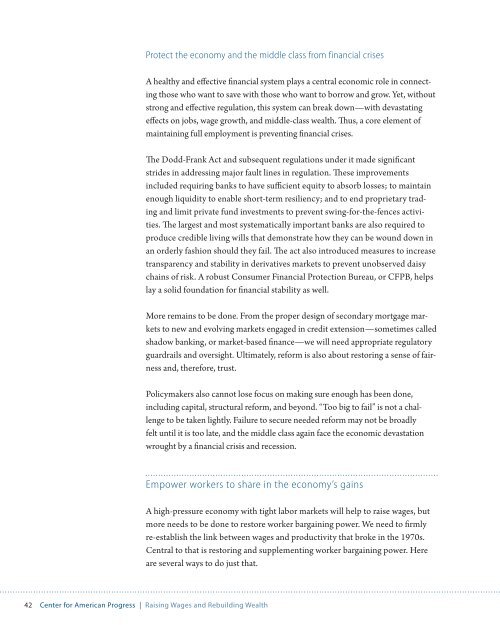AGENCY/PHOTOGRAPHER
RaisingWagesRebuildingWealth
RaisingWagesRebuildingWealth
You also want an ePaper? Increase the reach of your titles
YUMPU automatically turns print PDFs into web optimized ePapers that Google loves.
Protect the economy and the middle class from financial crises<br />
A healthy and effective financial system plays a central economic role in connecting<br />
those who want to save with those who want to borrow and grow. Yet, without<br />
strong and effective regulation, this system can break down—with devastating<br />
effects on jobs, wage growth, and middle-class wealth. Thus, a core element of<br />
maintaining full employment is preventing financial crises.<br />
The Dodd-Frank Act and subsequent regulations under it made significant<br />
strides in addressing major fault lines in regulation. These improvements<br />
included requiring banks to have sufficient equity to absorb losses; to maintain<br />
enough liquidity to enable short-term resiliency; and to end proprietary trading<br />
and limit private fund investments to prevent swing-for-the-fences activities.<br />
The largest and most systematically important banks are also required to<br />
produce credible living wills that demonstrate how they can be wound down in<br />
an orderly fashion should they fail. The act also introduced measures to increase<br />
transparency and stability in derivatives markets to prevent unobserved daisy<br />
chains of risk. A robust Consumer Financial Protection Bureau, or CFPB, helps<br />
lay a solid foundation for financial stability as well.<br />
More remains to be done. From the proper design of secondary mortgage markets<br />
to new and evolving markets engaged in credit extension—sometimes called<br />
shadow banking, or market-based finance—we will need appropriate regulatory<br />
guardrails and oversight. Ultimately, reform is also about restoring a sense of fairness<br />
and, therefore, trust.<br />
Policymakers also cannot lose focus on making sure enough has been done,<br />
including capital, structural reform, and beyond. “Too big to fail” is not a challenge<br />
to be taken lightly. Failure to secure needed reform may not be broadly<br />
felt until it is too late, and the middle class again face the economic devastation<br />
wrought by a financial crisis and recession.<br />
Empower workers to share in the economy’s gains<br />
A high-pressure economy with tight labor markets will help to raise wages, but<br />
more needs to be done to restore worker bargaining power. We need to firmly<br />
re-establish the link between wages and productivity that broke in the 1970s.<br />
Central to that is restoring and supplementing worker bargaining power. Here<br />
are several ways to do just that.<br />
42 Center for American Progress | Raising Wages and Rebuilding Wealth


